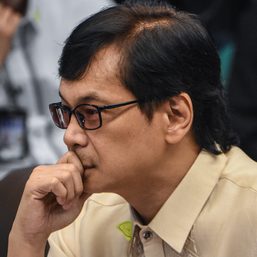SUMMARY
This is AI generated summarization, which may have errors. For context, always refer to the full article.

Mayor Alice Guo of Bamban, Tarlac in Central Luzon, is currently in hot water for a string of reasons.
First, the local chief is at the center of a Senate probe to determine her alleged ties to illegal Philippine Offshore Gaming Operators (POGO) situated in her town. Guo is being linked with the Zun Yuan Technology Incorporated, which was raided by authorities in March this year due to complaints of human trafficking and serious illegal detention.
When the issues on POGOs – now called internet gaming licensees – reached the Senate, another issue concerning Guo had floated. During the series of Senate hearings, lawmakers flagged the mayor’s shady background, with opposition Senator Risa Hontiveros raising the question of whether Guo is an “asset” planted by China to infiltrate local politics.
Lawmakers were puzzled because the mayor claimed she doesn’t remember basic details about her life. These include her birthplace, why her birth was only registered when she was 17, and what home school program she took.
Push for suspension
In an order dated May 31, but was released on June 3, Ombudsman Samuel Martires granted the DILG’s prayer for preventive suspension against Guo. The Ombudsman also suspended Edwin Ocampo, Bamban’s business permit and licensing officer, and Adenn Sigua, the town’s municipal legal officer.
The Ombudsman’s order stemmed from the complaint filed by the DILG against Guo and other officials over grave misconduct, serious dishonesty, gross neglect of duty, and conduct prejudicial to the best interest of the service. The Ombudsman added it found sufficient grounds to suspend the three because there was strong evidence of their guilt.
As early as April, Hontiveros and Senator Sherwin Gatchalian urged the Department of the Interior and Local Government (DILG) to suspend Guo over her alleged links to the illegal POGO. Aside from Guo, Hontiveros said other public officials involved in the POGO business should also be suspended, pending the investigation.
After the Presidential Anti-Organized Crime Commission’s raid in Bamban, authorities were able to gather documents and other evidence pointing to Guo and other officials’ alleged involvement in the dubious business.
In May, the DILG did not suspend Guo, but rather made a recommendation. DILG Secretary Benhur Abalos said his agency recommended to the Office of the Ombudsman Guo’s preventive suspension. Abalos said the recommendation was the result of the DILG’s seven-person task force’s probe.
The body sent a report to the Ombudsman on May 17, saying “there are troubling findings of serious illegal acts which may have severe legal implications.” Abalos explained that the DILG has no suspension powers, that’s why they reached out to Ombudsman Samuel Martires.
“The DILG does not have the power to directly suspend or dismiss local officials. Hence, the DILG defers to the Ombudsman regarding any sanctions that may be imposed against Guo, in line with its disciplinary authority over elective officials of local governments,” the DILG chief explained.
Days after Abalos publicized the DILG’s recommendation to suspend Guo, he announced that Guo will also be stripped of her control and supervision over the police within her jurisdiction. Abalos also said he ordered the National Police Commission to initiate proceedings to revoke Guo’s mandate over the local police, after they found sufficient grounds to do so.
Ombudsman-DILG toss
Following Abalos’ announcement of their recommendation, Martires later said that his office did not receive a recommendation, but a fact-finding report about Guo’s case, according to a GMA News report. Martires then suggested to the DILG that it file a complaint instead with the necessary documents, so his office could examine the allegations against the local chief executive.
It appears that the DILG report, as far as the Ombudsman is concerned, does not constitute a complaint.
However, on Saturday, June 1, DILG Undersecretary for External, Legal and Legislative Affairs Juan Victor Llamas told Rappler that the interior department had already filed the complaint with the Office of the Ombudsman on May 24.
Llamas said their complaint against the Bamban, Tarlac, mayor fell under Anti-Graft and Corrupt Practices Act or Republic Act No. 3019.
He said Guo failed to revoke the business permit of the POGO in her town, despite the expiration of its Philippine Amusement and Gaming Corporation license. Aside from the mayor, other local officials face the complaint, the DILG official added.
The duties of the Ombudsman to promote accountability is enshrined in the 1987 Constitution.
Article XI, section 12 of the Constitution says that the Ombudsman and his deputies “shall act promptly on complaints filed in any form or manner against public officials or employees of the Government, or any subdivision, agency or instrumentality thereof, including government-owned or controlled corporations, and shall, in appropriate cases, notify the complainants of the action taken and the result thereof.”
Under its mandate, the office should also prioritize complaints filed against high-ranking officials and those in supervisory posts. The priorities include grave offenses and complaints involving large amounts of money and/or properties.
Republic Act (RA) No. 6770 or the Ombudsman Act of 1989 further strengthened and clarified the Ombudsman’s role in investigating local officials and ensuring accountability in government. Section 15 of the said law lists down the Ombudsman’s power, including the duty to probe and prosecute public officers and to take appropriate actions against officials “at fault or who neglect to perform an act or discharge a duty required by law.”
RA No. 6770 provides the Ombudsman with suspension powers. Section 21 states that the Ombudsman “shall have disciplinary authority over all elective and appointive officials of the Government and its subdivisions, instrumentalities and agencies, including Members of the Cabinet, local government, government-owned or controlled corporations and their subsidiaries.
Excluded from the Ombudsman’s power to suspend are officials who may be removed only through impeachment or members of Congress and the judiciary.
The Ombudsman issues preventive suspensions against officials under investigation to ensure the fairness of a probe, and to avoid the possibility of officials influencing the investigation through their position. This was the case in the suspension of Nueva Ecija Governor Aurelio Umali, who faces administrative complaints over his alleged illegal issuance of 205 quarry permits.

Another ongoing probe
In May, Solicitor General Menardo Guevarra said that they formed an investigating team “to determine if there is good reason to believe that the subject [Guo] is unlawfully holding or exercising public office.” Guevarra’s OSG serves as the government’s primary legal counsel.
Guevarra said they are gathering relevant information from other agencies such as the DILG, Department of Education, Commission on Elections, Bureau of Immigration, and the Philippine Statistics Authority.
This week, Guevarra reiterated that their probe’s focus is on Guo’s legal right to hold her post, and not on her wealth. He added that they “may use the Senate materials as reference.”
Under rule 66 of the Rules of Court, the Solicitor General or a public prosecutor can initiate a quo warranto petition against public officers suspected of usurping their office, or those who are not qualified for office in the first place.
Guevarra said that if they get enough information, they can file such a petition against Guo, questioning her right or authority over her position. It could result in getting her unseated or removed, as in the case of former chief justice Maria Lourdes Sereno. – Rappler.com
Add a comment
How does this make you feel?











![[WATCH] Is it Binay vs Binay again in Makati in 2025?](https://www.rappler.com/tachyon/2024/05/binay-tc.png?resize=257%2C257&crop_strategy=attention)




There are no comments yet. Add your comment to start the conversation.